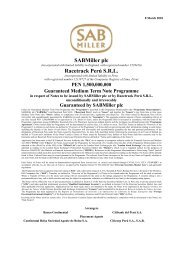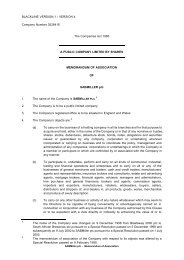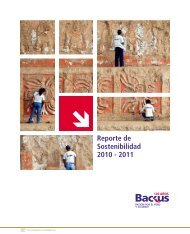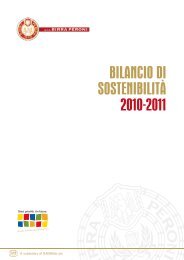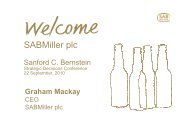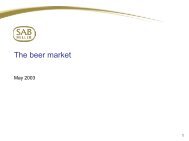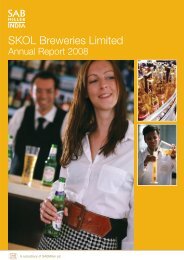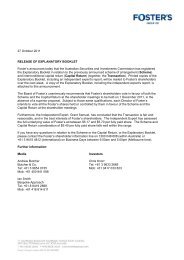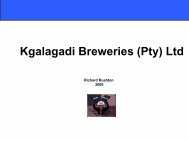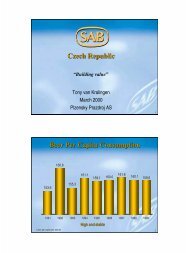Download the Corporate Citizenship Review 1999 ... - SABMiller
Download the Corporate Citizenship Review 1999 ... - SABMiller
Download the Corporate Citizenship Review 1999 ... - SABMiller
Create successful ePaper yourself
Turn your PDF publications into a flip-book with our unique Google optimized e-Paper software.
All breweries have programmes to minimise waste by ensuring recycling of plastics, cardboard, cans, scrap,<br />
paper, scrap metal and glass. Newlands brewery has taken this fur<strong>the</strong>r by establishing an empowerment company<br />
to manage and optimise waste recycling. This operation<br />
generates revenue of around US$8,000 (R45,000) per month.<br />
Kompania Piwowarska has introduced specific<br />
procedures for excessive noise, sewage pollution and waste.<br />
• RE-USE AND RECYCLING ▪ SAB COMPANIES WILL PROMOTE<br />
RE-USE AND RECYCLING INITIATIVES BOTH IN BUSINESS<br />
OPERATIONS AND IN COMMUNITIES, PARTICULARLY OF USED<br />
PACKAGING MATERIALS.<br />
These have substantially restricted or eliminated adverse<br />
influences on <strong>the</strong> environment. As a result, <strong>the</strong> company was <strong>the</strong> first Polish brewer to be granted a certificate of<br />
Cleaner Production in 1997. The company has instituted procedures for ISO 14000 compliance, and is aiming to<br />
achieve this by 2002. In addition to normal health and safety procedures, <strong>the</strong> company fully supports <strong>the</strong> national<br />
safety standard, Koniczyna, and has implemented <strong>the</strong> necessary processes to achieve five-leaf ratings. To comply with<br />
environmental legislation, both Lech and Tyskie breweries will convert <strong>the</strong>ir coal-based steam boilers to gas by June<br />
2002. This will save over 55,000 tons of coal per annum. Water usage by <strong>the</strong> breweries, at 6.9 hectolitres per hectolitre<br />
of beer, compares favourably with o<strong>the</strong>r European brewers. An anaerobic waste water treatment facility is planned at a<br />
cost of some US$4 million (R23 million), with completion scheduled for end 2001.<br />
In Uganda, Nile Breweries is literally metres away from <strong>the</strong> source of <strong>the</strong> Nile River. Its fine waters have been<br />
a direct contributor to Nile brands becoming market leaders. Accordingly, staff at <strong>the</strong> brewery are guided by a powerful<br />
moral and business imperative to conserve <strong>the</strong> environment by implementing cleaner manufacturing techniques.<br />
An environmental impact assessment has confirmed that <strong>the</strong> impact of Nile Breweries’ effluent is negligible.<br />
VARIOUS ENVIRONMENTAL<br />
PROGRAMMES HAVE BEEN<br />
LAUNCHED BY THE GROUP<br />
AND WILL BE USED TO<br />
MONITOR PRESENT AND FUTURE IMPACTS.<br />
South Africa now has <strong>the</strong> third highest beverage can recovery in <strong>the</strong> world, recovering<br />
over 1,8 billion cans in <strong>the</strong> past year. Collect-A-Can, which receives strong support from<br />
Beer South Africa, recovers 62 per cent of all beverage cans in South Africa, a rate<br />
considerably higher than that of o<strong>the</strong>r packaging material (paper 38 per cent, glass 23 per cent). Since its formation in<br />
1993, <strong>the</strong> company has created 20,000 jobs around <strong>the</strong> country and paid out more than US$8.8 million (R52 million) to<br />
PAGE THIRTY-FIVE<br />
CORPORATE CITIZENSHIP REVIEW



